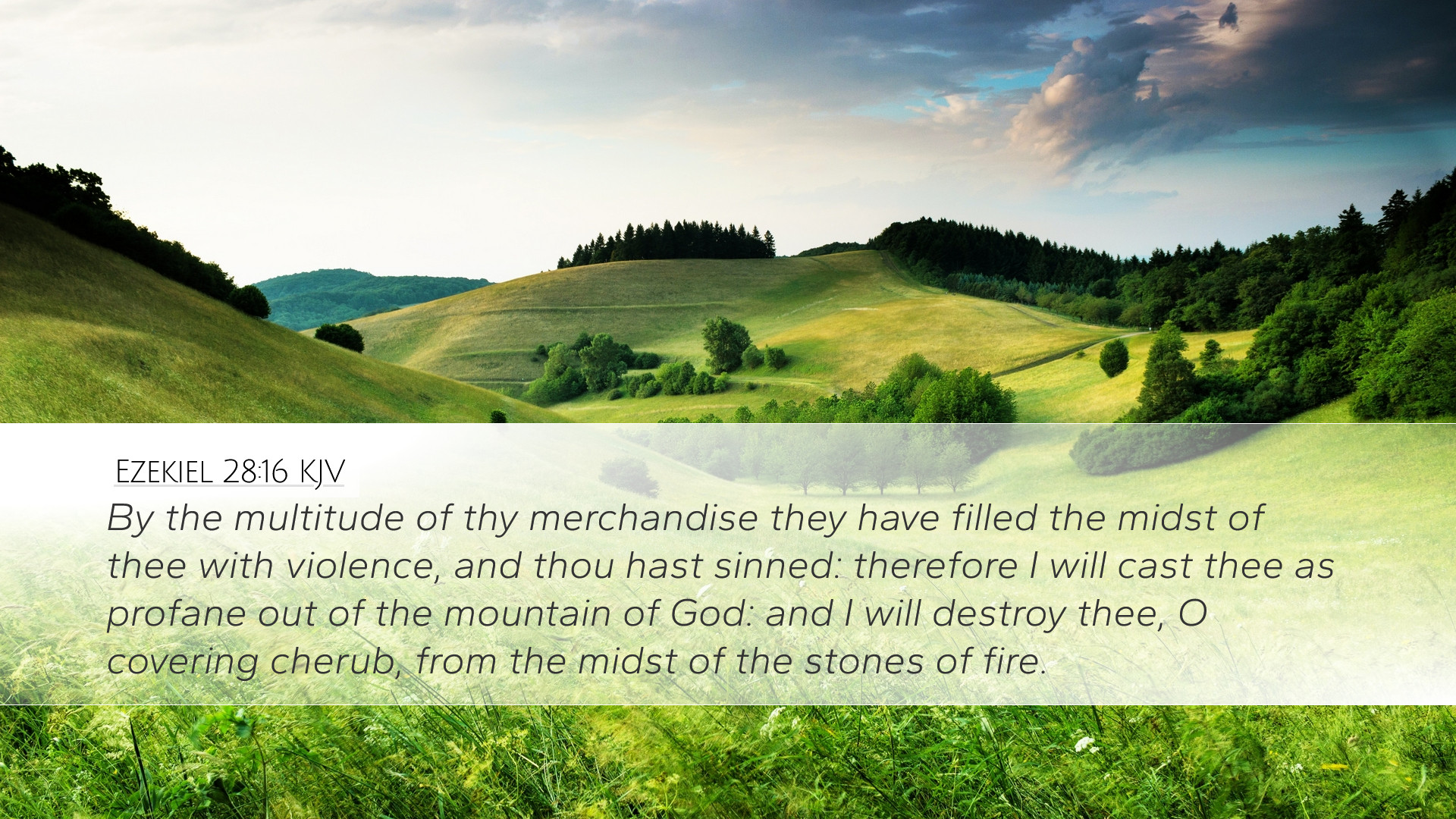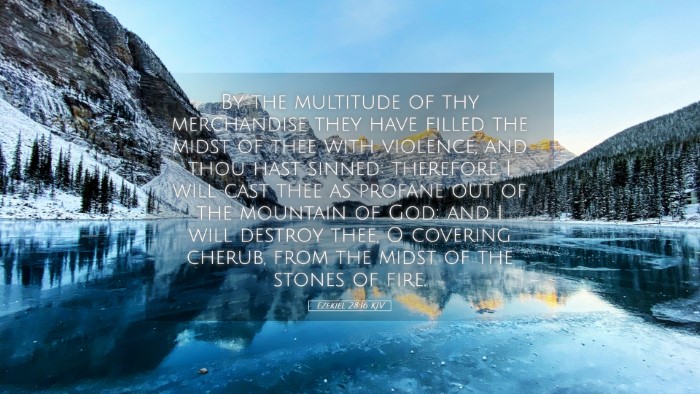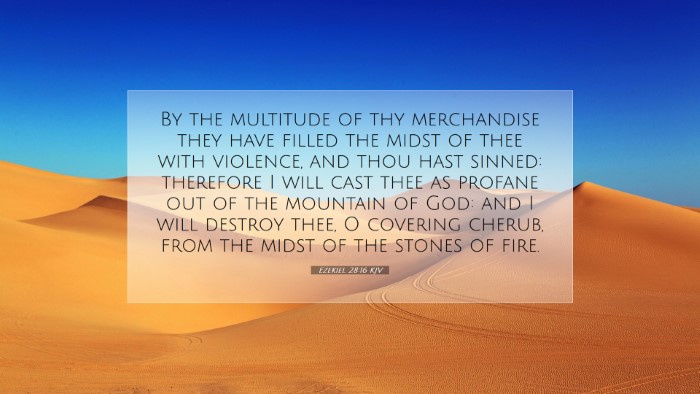Bible Commentary on Ezekiel 28:16
Ezekiel 28:16 states: "By the multitude of thy merchandise they have filled the midst of thee with violence, and thou hast sinned: therefore I will cast thee as profane out of the mountain of God: and I will destroy thee, O covering cherub, from the midst of the stones of fire."
Background and Context
Ezekiel 28 is a pivotal chapter in the prophetic book of Ezekiel, directed towards Tyre and its ruler, often interpreted as a type of the king of Babylon or even a metaphor for Satan himself. In this verse, we find an exploration of wealth, influence, sin, and its consequences.
Historically, Tyre was a significant trading city. Its economic prowess contributed to its pride and spiritual downfall, embodying the correlation between material success and moral decline. Ezekiel portrays the fall of both the city’s ruler and echoes a cosmic rebellion, bringing into perspective both earthly and spiritual dominions.
Commentary Insights
Matthew Henry’s Commentary
Matthew Henry posits that the phrase "By the multitude of thy merchandise" indicates that the wealth and commerce of Tyre corrupted its leader. The verse emphasizes that the king was filled with violence—an implicit warning regarding the destructive nature of unchecked prosperity. When riches become the object of our worship, they lead to moral decay.
Henry further elaborates on the role of sin, noting that righteous prosperity comes from God, while unrighteous gain leads to divine judgment. The term "profane" indicates a loss of holiness, suggesting that the king's actions not only led to his downfall but also had cosmic implications as he was a celestial being, likened to a "covering cherub".
Albert Barnes’ Commentary
Albert Barnes interprets this passage as a stark reminder of the consequences of pride and sin. He argues that the "multitude of thy merchandise" is symbolic of the king’s extensive trade, which eventually led to corruption. The king’s arrogance and subsequent violence stemmed from a misappropriation of power and wealth.
Barnes highlights that the term “destroy” signifies a comprehensive judgment. The phrase “O covering cherub” infers the leader's high status among heavenly beings, which adds gravity to his fall. His sin was not merely personal; it disrupted the order of both heaven and earth.
Adam Clarke’s Commentary
Adam Clarke elaborates on the notion of the "covering cherub". He suggests that this denotes a high-ranking angelic being, underscoring the gravity of the transgression. Clarke emphasizes that the downfall came as a result of sin manifesting in violence, a theme prevalent in the biblical narrative concerning the hubris of nations and their rulers.
Clarke also connects the riches of Tyre to its moral degradation, illustrating that affluence can often lead to spiritual blindness. He emphasizes that God's judgment is inevitable for those who allow commerce and material success to surpass their relationship with Him. Clarke poignantly notes the connection between divine justice and earthly behavior.
Theological Implications
The implications of Ezekiel 28:16 are profound for theologians and students alike. The passage serves as a theological cautionary tale about the nature of sin and the sovereignty of God.
- Sin and Its Consequences: The verse illustrates that sin, especially when it becomes systemic in a society or individual, leads to profound consequences including divine judgment.
- Wealth and Pride: The relationship between materialism, pride, and spiritual decay is crucial. Believers are reminded that earthly wealth is transient and must not become an idol.
- Divine Sovereignty: The ultimate authority of God to judge and to cast out is evident. It serves as a reminder that neither earthly rulers nor spiritual authorities are exempt from God’s righteous judgment.
- Judgment and Restoration: While the emphasis is on judgment, it leads to a question of potential restoration, a theme pervasive in Ezekiel’s prophecies. There is an underlying hope that repentance can still lead to redemption.
Practical Applications
For pastors and church leaders, this passage can be a vital teaching tool, emphasizing the importance of humility in leadership and reliance on God, particularly in times of success.
- Pride in Leadership: Leaders should remain vigilant against pride and recognize that their position is a stewardship from God, potentially susceptible to corruption.
- Material Wealth: Churches should be cautious in how they approach material blessings, always drawing connections to their spiritual implications and ethical uses.
- Call to Accountability: The corporate body of Christ must hold itself accountable for both individual and collective sins, understanding the gravity of actions on broader communities.
- Hope in Repentance: Highlighting the possibility of restoration through repentance can empower congregations to foster a culture of restoration, rather than condemnation.
Conclusion
Ezekiel 28:16 serves as a sobering reminder of the intertwining of material success and spiritual peril. As Henry, Barnes, and Clarke articulated, the passage encapsulates a cosmic narrative illustrating God’s sovereignty over his creation and the dire consequences of human arrogance. Through careful reflection, scholars and pastors can glean timeless truths about sin, wealth, and the call to humility before the God who judges all.


